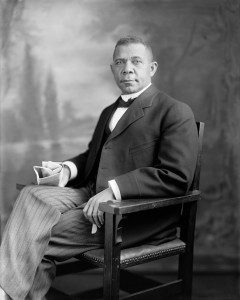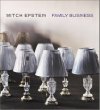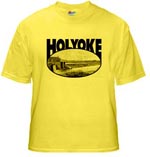by Laurel | November 29th, 2011
29 November 1909
Very Large Audience at First Congregational Church Last Evening — Address on Negro Problem.
Dr. Booker T. Washington, head of the Tuskegee Institute in Alabama, was the speaker at the First Congregational Church last evening. The church auditorium was packed to the doors, the gallery was filled and the audience gathered near the doors in the rooms opening on the auditorium to hear the speaker. Following pause by the door, the pastor H. O. Hannum offered prayer and a hymn, and Rev. Dr. J. S. Lyon of the Second Baptist church introduced the speaker. Dr. Washington said that he had spoken 24 times in the last 23 days and only brought was was left of his hope to Massachusetts.
In treating the negro problem he gave a brief history of his life from childhood to the present time, telling what had been accomplished at the Tuskegee institute and what was needed in the race which he represented. He enlivened his address with apt anecdotes, illustrating his points forcibly. In the introductory remarks he dwelt briefly on several suggestions which had been made to him from time to time regarding the solution of the negro problem. He said that the two had flourished, in spite of all the drawbacks which they had suffered. He spoke of the project of transporting the race to Africa, and also of other suggestions that a reservation be given them in which to live. The objection to this last point was that while it might be possible to keep the black man in by buildings walls and guarding the confines of the reservation, it would be impossible to keep the white man out, and he called attention to the lands reserved for the Indians and thought that some more practical solution must be found.
The work which he is accomplishing at Tuskegee was described, and the growth of that work was given. He said that one of the greatest difficulties which he encountered was in persuading the colored students that they out to work. The lessons of slavery days were firmly implanted, and it was felt by the freed slaves that it was a disgrace to work with their hands, and this belief had to be restored. Now a large number of trades are taught at the institution, and the students upon graduation are ready to take up some occupation at once and were self supporting. Mr. Washington believes the race problem is to be settled in this manner by teaching the negro to work and by making him self-supporting and self-respecting. No true negro, he said, should be ashamed of his race, but should be as proud of being a negro as any other man should be of the race to which he belonged. He has done much for his race and will do much more without doubt.
Adapted from The Springfield Republican; image is in the public domain via both Library of Congress and Wikipedia.









